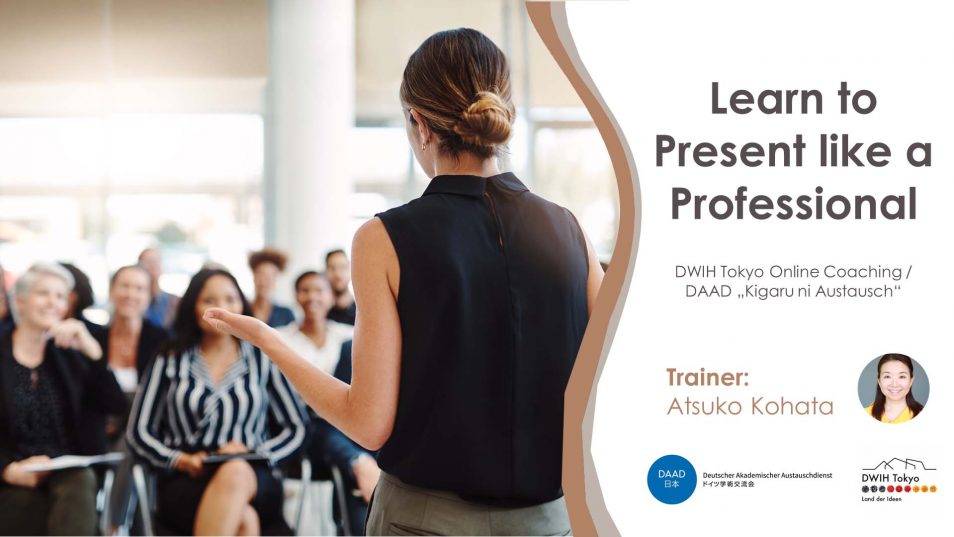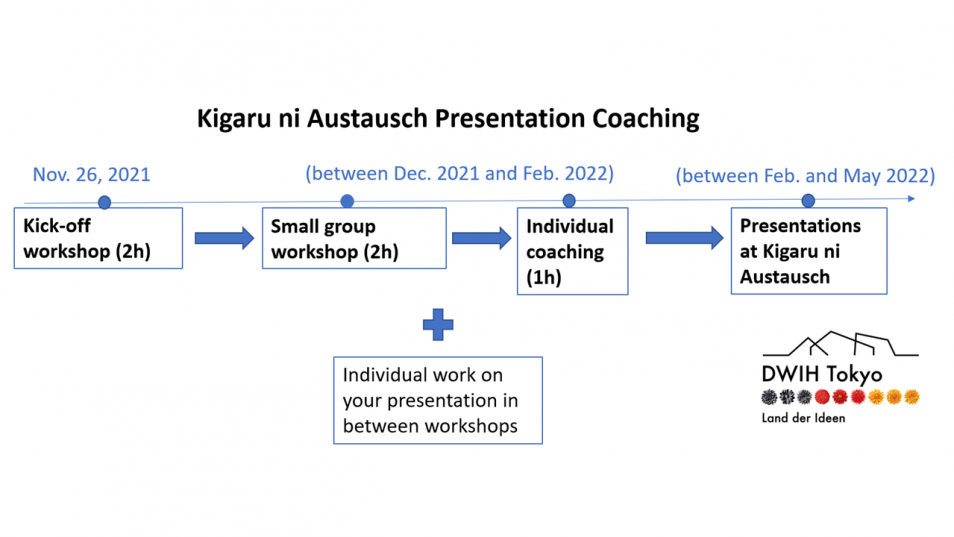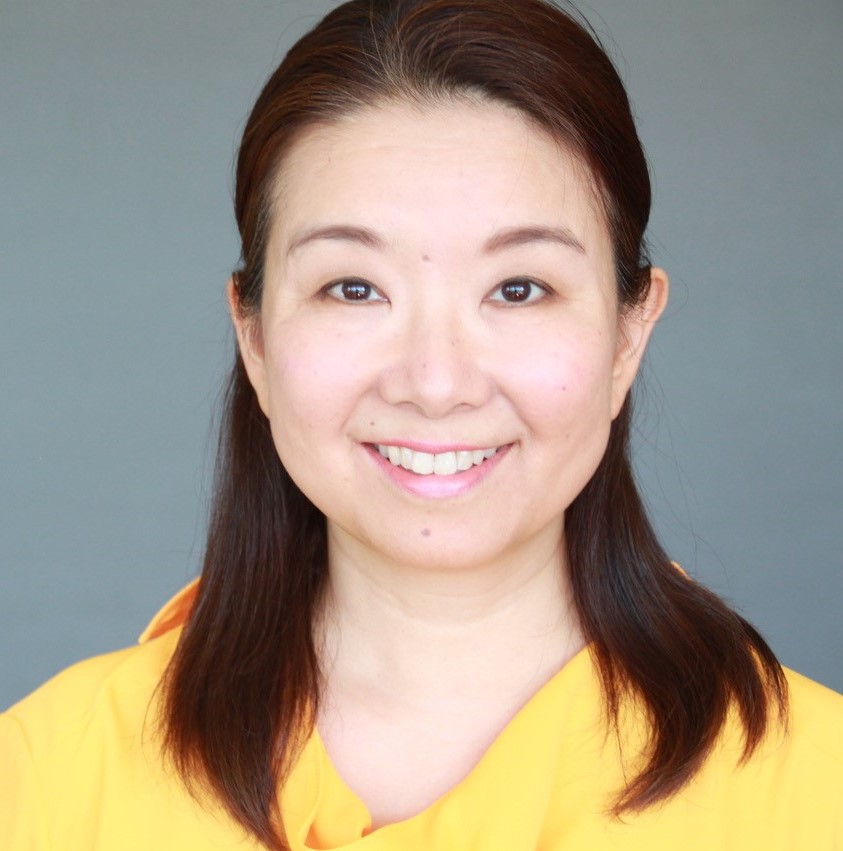Learn to Present like a Professional

Presenting is a key competence for scientists. DWIH Tokyo invites students and young researchers from Germany and Japan to a virtual presentation coaching*. In direct conversation with bilingual expert Atsuko Kohata, participants will learn how to improve their presentation techniques and effectively communicate their areas of interest to an international audience unfamiliar with the subject. After the coaching, participants will hold a lecture in English at the DAAD event series “Kigaru ni Austausch”. A certificate of completion can be issued upon request.
Event Information
November 26, 2021
Online
Organizer(s): DWIH Tokyo / DAAD Kigaru ni Austausch
How does the coaching work?
The coaching consists of 4 modules. Participation in all modules is required for completion.
1) Kick-off on 26th November 2021 (17:00-19:00 JST / 9:00-11:00 CET): Get to know each other and lecture by Ms. Atsuko Kohata
2) Group Work: test presentation & feedback in small groups, defining individual challenges
3) Individual coaching: work on individual challenges 1:1 with the trainer
The dates for the group and individual coaching will be set flexibly between December 2021 and February 2022 in consultation with the participants and the trainer.
4) Online presentation at Kigaru ni Austausch: The participants give their final presentation as part of the DAAD series “Kigaru ni Austausch” (see below).
The date will be set in consultation with the DAAD between February and May 2022.

Who can apply?
Applications are open to German and Japanese students (in their bachelor’s, master’s, or doctoral studies) and postdocs (doctorate within the last six years) of all subjects with an interest in the other country and who are confident enough to give a 20–30-minute talk in English. Students and postdocs of other nationalities can apply if they belong to a German university or research institution.
How can I apply?
To apply, please email the completed form in English or Japanese (one language is sufficient!) to Mr. Wenz (wenz(at)daadjp.com).
Deadline is 02.11.2021
*If more applications are received than there are places available, a selection of participants will be made. The selection will be based on the originality and relevance of the proposed topic. In the distribution of places, attention will also be paid to a gender balance and between German and Japanese participants.
Download the application form: Application form
About the trainer
 Atsuko Kohata has nearly 30 years of experience as a TV presenter and radio personality. Fluent in both Japanese and English she hosted many entertainment and English educational programs in Japan and appeared as a guest speaker in numerous events. As the original film section host for 6 years on the highly popular KING’S BRUNCH (TBS) TV show, she not only pioneered the Hollywood star interview but elicited extraordinary performances from her guests. Among these she got to tango with Antonio Banderas, hip hop with Will Smith and arm wrestle with Tom Cruise. More
Atsuko Kohata has nearly 30 years of experience as a TV presenter and radio personality. Fluent in both Japanese and English she hosted many entertainment and English educational programs in Japan and appeared as a guest speaker in numerous events. As the original film section host for 6 years on the highly popular KING’S BRUNCH (TBS) TV show, she not only pioneered the Hollywood star interview but elicited extraordinary performances from her guests. Among these she got to tango with Antonio Banderas, hip hop with Will Smith and arm wrestle with Tom Cruise. More
About “Kigaru ni Austausch” and possible topics
In the Kigaru ni Austausch event series, German and Japanese DAAD-scholarship holders and alumni informally discuss topics that interest them for personal or academic reasons and that are related to their lives and studies in Japan or Germany. The speakers are expected to communicate their topics in a way that is understandable to laypersons, to facilitate dialogue across cultural and subject boundaries. The events are informal and contribute to the German-Japanese exchange and networking among scholarship holders and alumni on a small scale. In Japanese, “kigaru ni” means something like “relaxed” or “informal”.
The events take place online and are open to DAAD-scholarship holders and alumni in Japan. German and Japanese students in Japan who have not yet been funded by the DAAD can participate in the events if they give a presentation themselves. If you are interested, please contact Mr. Wenz by e-mail (wenz(at)daadjp.com).
Topics of past events:
• My life in Japan, and how I escaped the foreign bubble
• Law in everyday life: Japan and Germany in comparison
• Psycholinguistics: how our mother tongue influences our hearing
• Exploring Tokyo through Story and History (in English)
• Life Science in Japan – two Japanese winners of the Nobel Prize for Physiology/Medicine (in English)
• Activism and vegetarianism in Japan (in English)
• Friendships and other relationships on a linguistic level in German and Japanese
• Religion in Germany and Japan
